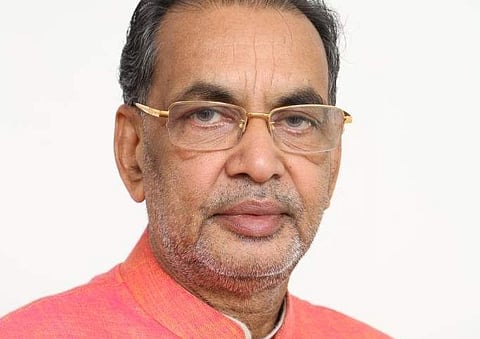

COLOMBO: The Indian Minister of Agriculture and Fisheries, Radha Mohan Singh, is to take up the issue of the return of Tamil Nadu fishing vessels seized by Sri Lanka as punishment for poaching in Sri Lankan waters, when he meets his Sri Lankan counterpart, Mahinda Amaraweera, here on Monday.
In a statement issued on the eve of the first meeting of the reconstituted Joint Working Group on Fishing (JWGF), Singh said that he would discuss: “Permanent solutions to the problems and issues of fishermen; possibilities of cooperation in patrolling; possibility of the early release of apprehended fishing vessels and fishermen of both sides; and promotion of deep sea fishing by expediting the provision of tuna long liners.”
New Elements
The new elements in the agenda are: joint naval and coast guard patrolling of the International Maritime Boundary Line (IMBL) to prevent Tamil Nadu fishermen from crossing it and getting arrested; the return of vessels seized by Sri Lanka for poaching; and expediting the project to persuade Tamil Nadu fishermen to go for deep sea fishing by switching to tuna long liners.
India had, until October last year, been averse to joint patrolling by the navies or coast guards of the two countries for fear of incurring the wrath of the Tamil Nadu political parties and the government in Chennai. But since Sri Lanka had threatened to impose a fine of LKR 150 million or INR 7 crore on poachers, India had to sit up and take notice.
Colombo had to talk in terms of fines as it had been under pressure from the European Union (EU) to curb illegal fishing if it wanted the EU to lift the ban on fish imports from Sri Lanka. Minister Amaraweera told DailyFT on Monday that as per EU norms, the minimum fine would be close to LKR 9 million (about INR 4 to 4.5 million).
As regard the release of seized vessels, India had not been pressing for their release so long because it was one legitimate way of preventing intrusion into Sri Lankan waters. While the release of arrested fishermen was seen as a legitimate humanitarian demand as fish workers came from indigent families, the demand for the release of vessels was not seen as a humanitarian one as the boats were owned by wealthy fish traders.
However, the issue of the release of vessels became a political issue as seizures had created economic problems in Tamil Nadu.
At the moment there are about 122 Tamil Nadu vessels and 51 fishermen in Sri Lankan custody.
It is significant that Minister Singh will discuss the expeditious replacement of shallow water trawlers by deep sea going tuna long liners. The idea is to divert Tamil Nadu fishermen from shallow water fishing in the narrow sea between Tamil Nadu and North Sri Lanka to deep sea fishing in the Bay of Bengal.
The late Tamil Nadu Chief Minister J.Jayalalithaa had given Prime Minister Narendra Modi a detailed plan to replace shallow water trawlers by tuna long liners and sought funds running into hundreds of crores. But the action plan neither got sufficient funds nor was the scheme well targeted, experts told Express.Hopefully, following the JWGF meeting in Colombo on Monday, the scheme will be speeded up and better targeted.